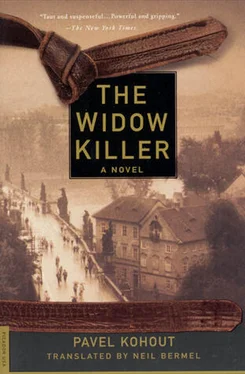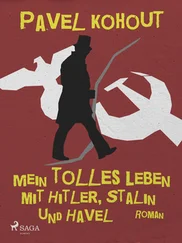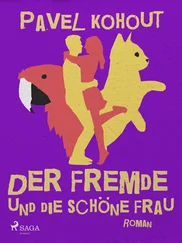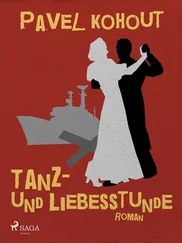The low curtains of grapevines stretched out far and wide around them, with not a person in sight, and so he shouted at her. How could she, how dare she lend her voice to such filthy suspicions — now of all times, when only the iron will of a united Germany could overcome their ideologically confused and disorganized enemies?
Endless times since then he had imagined this scene, seen the colors, smelled the scents, heard Hilde and himself, and his regret at spoiling their last day together grew stronger with the suspicion that maybe she had been right after all.
If Germany won, the defeated Allies would rebuild its shattered cities and would cede their poorly managed and sparsely populated eastern territories as reparations — but was there any hope for the basic human values that years of mutual slaughter had ruined? And could anyone anywhere even begin to take the place of his Hilde and Heidi?
Tonight, high above a city that would soon be celebrating its freedom from the Occupation, a devastating analogy occurred to him for the first time: could the German Führer derive the same perverted satisfaction from the worldwide butchery he’d unleashed as the unknown murderer did from his bloody slaughter of women?
He was freezing. Chills crept across his body; he must have goose-bumps! Then he realized why.
The reckless comparison he had just drawn instantly made him the worst sort of criminal, the kind most of his colleagues at Bredovská Street would send to the basement and then (after a short trial) to the camps or the old military shooting range in the northern suburbs. He imagined how Meckerle would react if he said it aloud. If it happened face-to-face, Meckerle would relieve him of duty and lock him in the asylum; if it happened during a staff meeting, he would probably kill Buback on the spot.
But it was not fear that made Buback shiver; fear was one thing he had never been prone to, and he knew he was too experienced — or too cunning? — to be hoisted by his own petard. However, he was alarmed at what was happening to him. What was anything worth if out of the blue, after years of faith, he gave in to suspicions that went far beyond Hilde’s small question on that final afternoon? Was he a common traitor? A coward, afraid of defeat? A victim of enemy propaganda? Or… or had he simply been slow to discover a historic blunder that he helped perpetrate, and now stood horrified at the chilling fate awaiting him and his country?
This last explanation was the most morally justifiable one — but then what difference was there between him and countless other Germans, who, he had heard, paid for far milder speculations in penal gangs, colonies, camps, and at the gallows?
A strange rhythmic sound drowned out the distant gunfire and distracted him from his thoughts. Just ahead, the path ended at a locked gate in a massive wall. The local Gestapo man had mentioned earlier a Brno castle that had been a notorious political prison in Austro-Hungarian days. The good life, compared to today’s prisons, his local colleague had said, grinning; Vienna treated them with kid gloves and look what happened!
Now Buback could make out the rustling of last year’s leaves, the sound of panting, and two Czech voices whispering.
“Love me! Yes! Love me! Yes yes yes!”
Incredible! A chill night, a steep slope, the gloomy cells a stone’s throw away, mass slaughter within earshot, and with all this, two fragile human beings fall in love. And that means hope: an eternal new beginning that repairs the worst brutalities of history.
Suddenly he wanted to live to see it. And the face he pictured belonged to the Czech girl with the brown eyes.
He found a dozen small jars of lard in the pantry — apparently she’d made individual monthly portions — and a pot of lentil soup with a surprisingly large chunk of sausage, which he heated up on the cylinder stove; all he had to do was shove some wood in. He even discovered a bottle of elderberry wine and tucked into a feast prepared for another man. There was a store of logs by the stove; soon it was almost hot in the apartment kitchen. He packed his booty in wax paper next to the rolled-up straps in the suitcase and placed it out in the chilly entrance hall.
The pale body on the dining table grew warm. He touched the skin on the shoulder. It was rough and dry. He realized with a shock: dead people don’t sweat! His own shirt was quite damp after the meal, and the wine had flushed his cheeks. But he did not go into the bedroom, although it might have been more pleasant. This was his first opportunity to get a good, uninterrupted look at what he’d done.
MY DEED!
He was pleased he had finally worked out his opening lines. He’d behaved like an idiot and taken a terrible risk by almost frightening the first two to death. The one in Brno had become an animal fighting for her life; he barely overpowered her. In the second case she had fortunately RECOGNIZED HIM and given herself up; anyone with an ounce of self-preservation would have put up a fight. He had finally hit on it after puzzling the matter over and over at home, and he had decided to start next time by gaining their TRUST.
Today’s events had proved him right. He had stunned her so perfectly that he was able to make all the NECESSARY PREPARATIONS without hurrying. She had come to on the table, naked, bound, and trussed, in time to see what was happening to her. He retained the same procedures and was satisfied at how effortless it was compared to the woman on the embankment. This time, all he heard was some weak moaning. The body’s jerking did not prevent him from making all the cuts just as he was supposed to. She held out surprisingly long; almost, it seemed, until he cut IT out.
He took his gloves off again and touched first her, then himself, to see if a dead body felt different from a live one. It did not seem to. Her hair was thus all the more surprising. He had held her by it — it was long — when she fell into the wardrobe; the strands had flowed through his palms as he tied her to the tabletop, and were still hairs. As he examined them now, they did not separate; they reminded him of the hemp fiber he had used to clean his freshly oiled implements. So this was a new discovery:
THE HAIR DIES FIRST.
He studied her fingers close up to confirm what he knew from the Hungarian campaign:
NAILS AND MUSTACHES LIVE THE LONGEST.
He remembered helping to bury a lad who had barely grown his first whiskers before they closed the tulle-covered lid on his coffin. Now he raised the severed head and nodded, satisfied: a small mustache was clearly growing on the black-haired woman’s upper lip.
Enough for today; it was time to head back. He pulled the gloves back on, changed his clothes, checked carefully that he had left no telltale traces, put on his hunting coat, and on sudden impulse stuffed the brightly glowing stove with wood until it would not close. Let the ROTTENNESS here truly ROT for when her paramour arrives!
He listened at the door. The staircase was silent. The short street was empty as well when he peered cautiously out. He walked down it without meeting a soul. Still he was burdened by the nagging thought that he had forgotten something. At the main train station, he remembered: the caretaker! He had wanted to finish him off before leaving today. But it was still light and night trains were infrequent these days. Anyway, the man couldn’t recognize him unless they were brought face-to-face. The main thing, then, was the alibi; he could not afford even a shadow of suspicion to fall on him.
The station loudspeaker in the waiting room boomed a warning over and over about how to behave during the low-flying “tinker” machine-gun attacks from Allied pilots, which strafed locomotives on the tracks of the Protectorate. He knew the announcement by heart; although he firmly believed that SHE would protect him, he always sat in the last car anyway.
Читать дальше












